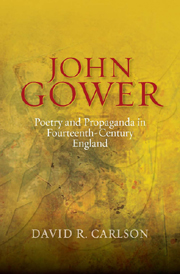Introduction: Gower in History
Published online by Cambridge University Press: 05 February 2013
Summary
More history than John Gower, perhaps; much of state-papers, little literary criticism. Provision needs always be made for poetry's special character, and it is. In poetry, materiam superat opus; in prose too, including the government documents. Gower and the other contemporary writers who so laboured over the fourteenth-century prose and verse were all mundane historical actors as well. They were in witness to their times, in what writing of theirs remains, and so reflect or refract conditions. In fact the late medieval writers also intervened in the historical materia with which they lived – processus might be preferable to Ovid's term; they made change – however slight, still sensible alteration – some of them more deliberately than others, more actively, and those some not always but only at some times. “A serious, honest mind understands – and can understand – nothing of history,” it is said; “history in return is marvelously suited to delight an erudite cynic.” Though motives are partial or at best mixed, the objective herein is also so narrow.
The matter is to establish that poetry was written in fourteenth-century England by sponsorship of the monarchic state, in prosecution of state-official purposes, and that the slight though century-long official verse-production culminated in the late writings of the English poet John Gower (d. 1408), “ancient” and “moral,” most critically his Cronica tripertita and “In Praise of Peace,” the one Latin, the other an English-language performance, c. 1399–1405.
- Type
- Chapter
- Information
- Publisher: Boydell & BrewerPrint publication year: 2012



